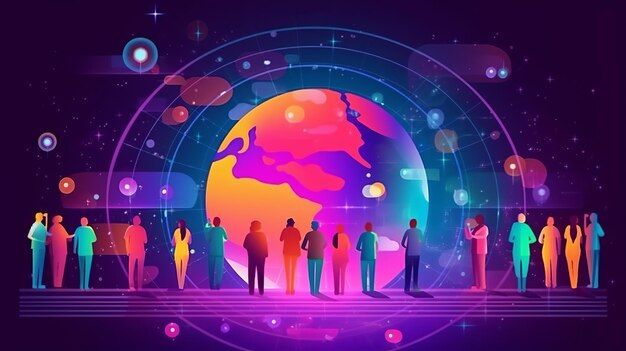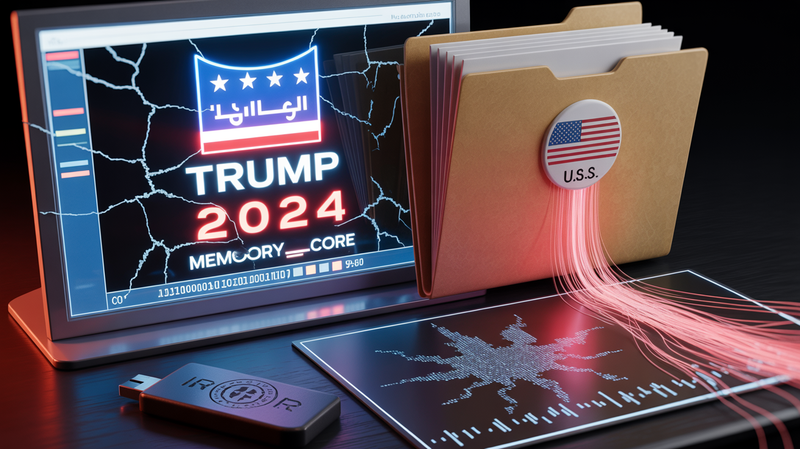Embracing the Dawn: The Rise of Digital Global Citizenship
In the grand tapestry of human evolution, each epoch has been defined by groundbreaking technological breakthroughs. These innovations have irreversibly altered the course of history, transforming societies, economies, and cultures. Today, we find ourselves on the cusp of yet another transformative era, marked by rapid digitalization and innovation. In this

In the grand tapestry of human evolution, each epoch has been defined by groundbreaking technological breakthroughs. These innovations have irreversibly altered the course of history, transforming societies, economies, and cultures. Today, we find ourselves on the cusp of yet another transformative era, marked by rapid digitalization and innovation. In this pivotal moment, we witness the emergence of the Digital Global Citizen, a new identity transcending conventional boundaries.
The Digital Global Citizen: A New Identity:
The Digital Global Citizen represents a paradigm shift, a move away from traditional notions of race and generation. It is the birth of a new kind of global identity, one that goes beyond national borders, ethnicities, and language barriers. Forged in the crucible of interconnected networks and shared digital experiences, these individuals navigate the online realm with an inherent fluency, their perspectives and values molded by a universal digital culture.
Understanding the Digital-Centric New World Order:
As we navigate this digital-centric New World Order, it is imperative to comprehend the nuances of this evolution. The Digital Global Citizen is at the very heart of this transformation, holding the key to unlocking the immense potential of our interconnected world. It is through understanding and embracing this new identity that we can ensure the digital age acts as a catalyst for unity, fostering a future of global collaboration and mutual understanding.
The advent of the digital age has ushered in a new era in human history, redefining the way we connect, communicate, and collaborate. The Digital Global Citizen stands at the forefront of this evolution, embodying a global identity that transcends traditional boundaries. As we continue to delve into the complexities of this digital-centric world, let us embrace the promise of the Digital Global Citizen, ensuring a future marked by shared understanding, global cooperation, and a unified humanity.
A Digital-Centric New World Order: Surveillance and Unified Protocols:
In an increasingly interconnected world, the importance of the digital realm cannot be overstated. From the way we communicate and conduct business to how we receive news and even shape our societal values, everything is pivoted on digital advancements. But with these profound changes come profound challenges. The free flow of information, while liberating, has also given rise to misinformation, cyber threats, and a host of other digital dilemmas. Enter the concept of a digital-centric New World Order – one built upon the pillars of global surveillance and unified protocols.
Understanding Today’s Digital Anarchy:
- The Misinformation Tsunami: With the rise of the internet came the democratization of information, but this has been a double-edged sword. Now, anyone can broadcast unverified claims, leading to a tidal wave of misinformation. This flood not only fuels societal divisions but also amplifies political extremism, sparks public health crises, and undermines trust in established institutions.
- The Tumult of Global Unrest: The digital age has witnessed an escalation in conflicts, protests, and mass migrations. Wars, exacerbated by cyber warfare, displace millions, creating a surge of refugees desperate for sanctuary. Simultaneously, economic disparities and social injustices, magnified in the online spotlight, lead to global protests demanding change. The rapid dissemination of news and ideologies online can mobilize communities faster than ever, for better or worse.
- Digital Vulnerabilities: The virtual realm is fraught with dangers. Cyberattacks, which once belonged to the realm of science fiction, have become a grim reality. Hacks targeting national infrastructures and individual data breaches can destabilize economies, sow mistrust among allies, and even precipitate geopolitical conflicts.
- The Shadow of the Dark Web: Lurking beneath the surface of the regular internet is the dark web, a clandestine space teeming with illicit activities. From drug trades, weapon sales, to human trafficking, its sinister corridors pose significant challenges to global security. The decentralized, anonymous nature of the dark web makes it a labyrinth, nearly impossible for law enforcement agencies to fully penetrate.
As our world continues to grapple with these challenges, it becomes evident that the digital realm, while a frontier of opportunity, also presents multifaceted threats that require unified, global solutions.
The Imperative for a New Digital Order:
Given the above challenges, the creation of a digital-centric New World Order is not just a lofty ideal; it's a necessity. This New World Order would entail:
- Global Digital Surveillance: Far from being a tool of oppression, this could serve as a protective net over the digital realm. Think of it as an early detection system – one that can track the beginnings of a cyberattack, trace the roots of misinformation, or even detect illicit activities on the dark web.
- Unified Cybersecurity Protocols: Instead of every nation or corporation having its own set of cybersecurity standards, a global, unified approach can ensure that every entity, big or small, adheres to a gold standard of security. This is essential in an era where a vulnerability in one system can potentially compromise the larger digital ecosystem.
- Digital Citizenship and Education: As we move towards a digital future, it's essential to equip every global citizen with the tools to navigate this realm safely. This involves not just access to technology but also comprehensive digital education – teaching individuals to differentiate between genuine information and misinformation, understand online etiquette, and be aware of potential threats.
A digital-centric New World Order, anchored in surveillance and unified protocols, might sound daunting. However, it is crucial to view this through the lens of protection and progress. By establishing order in the digital chaos, we pave the way for a world where technology serves as a beacon of progress, rather than a tool of division. The challenges of today require forward-thinking, global solutions. As the lines between the physical and digital worlds blur, it is time to envisage and work towards an integrated future, where digital peace, security, and prosperity are a reality for all.
Bridging the Gap: Digital Ethics and Human Values:
In the tumultuous dance between technology and humanity, a crucial component often gets overlooked: the convergence of digital ethics and human values. As the digital realm becomes increasingly influential, it begs the question: how do we ensure that the tools and platforms of the future are built and operated with a foundation of ethical considerations?
- The Duality of AI and Ethics: Artificial intelligence (AI) offers boundless potential, from medical breakthroughs to efficient urban planning. However, with its rise come questions about bias, autonomy, and the value of human judgment. Ensuring AI systems are designed with fairness and transparency in mind is paramount to avoid deepening societal divides.
- Data Privacy and Individual Rights: In an age where data is the new currency, safeguarding individual privacy becomes a cornerstone of the digital future. Striking a balance between the benefits of big data and the rights of individuals is crucial. This involves creating robust mechanisms that give individuals control over their personal data, ensuring they are not just passive participants but active stakeholders in the digital economy.
- Digital Inclusivity: For the dream of a unified digital world to become a reality, inclusivity must be at its heart. This means not only bridging the digital divide by providing access to underserved communities but also ensuring platforms and tools are designed to be universally accessible, irrespective of age, disability, or socioeconomic status.
- Reimagining Governance: Traditional governance models may fall short in the face of rapid technological advancements. To foster trust and collaboration in the digital age, we need innovative governance models that are agile, transparent, and inclusive. This requires a shift towards more decentralized and participatory forms of decision-making, ensuring that the voices of all stakeholders, including the Digital Global Citizen, are heard and valued.
Digital Diplomacy and International Cooperation:
In the interconnected world of the Digital Global Citizen, international cooperation becomes more critical than ever. The challenges posed by digital technologies do not respect national borders, and as such, require coordinated global responses.
- Fostering International Collaboration: Countries around the world must come together to establish international norms and standards for digital behavior. This includes agreements on cyber warfare, data privacy, and the use of AI. By fostering a spirit of collaboration, we can create a digital world that is safe, secure, and beneficial for all.
- Building Digital Trust: Trust is the cornerstone of any functioning society, and in the digital age, it is no different. Building digital trust requires transparency, accountability, and the establishment of reliable security protocols. It also requires efforts to combat misinformation and ensure the integrity of digital content.
- Promoting Innovation and Responsible Research: As we navigate the digital future, innovation will be key. However, it must be balanced with ethical considerations and responsible research practices. This means investing in research that not only pushes the boundaries of what is possible but also considers the potential societal impacts of digital technologies.
The Future of Work and Education in a Digital World:
The rise of the Digital Global Citizen coincides with profound changes in the world of work and education. Automation, AI, and other digital technologies are transforming industries, creating new opportunities but also new challenges.
- Preparing for the Future of Work: The skills required for the jobs of the future are rapidly evolving. There is a growing need for digital literacy, as well as skills such as critical thinking, creativity, and emotional intelligence. Education systems must adapt to prepare students for this new world of work, ensuring they are not only technologically proficient but also possess the soft skills needed to thrive.
- Embracing Lifelong Learning: In a world where change is the only constant, the concept of lifelong learning becomes increasingly important. This means creating opportunities for continuous education and skills development, ensuring that individuals can adapt to the evolving demands of the digital age.
- Fostering a Culture of Innovation: For societies to thrive in the digital future, a culture of innovation must be cultivated. This involves encouraging curiosity, experimentation, and a willingness to take risks. It also means providing the necessary support and resources to turn innovative ideas into reality.
Conclusion: Navigating the Digital Horizon:
As we stand on the brink of a new era, the role of the Digital Global Citizen becomes ever more crucial. These individuals, fluent in the language of the digital world, are poised to lead us into a future marked by innovation, connectivity, and global collaboration.
To navigate this digital horizon, we must embrace the complexities of the digital world, recognizing both its potential and its pitfalls. We must also commit to fostering a digital society that is inclusive, ethical, and rooted in human values.
The journey ahead is fraught with challenges, but it is also filled with unparalleled opportunities. As we chart our course through the digital landscape, let us do so with a sense of purpose, a commitment to progress, and a belief in the power of the Digital Global Citizen to shape a better, more connected world for all.




